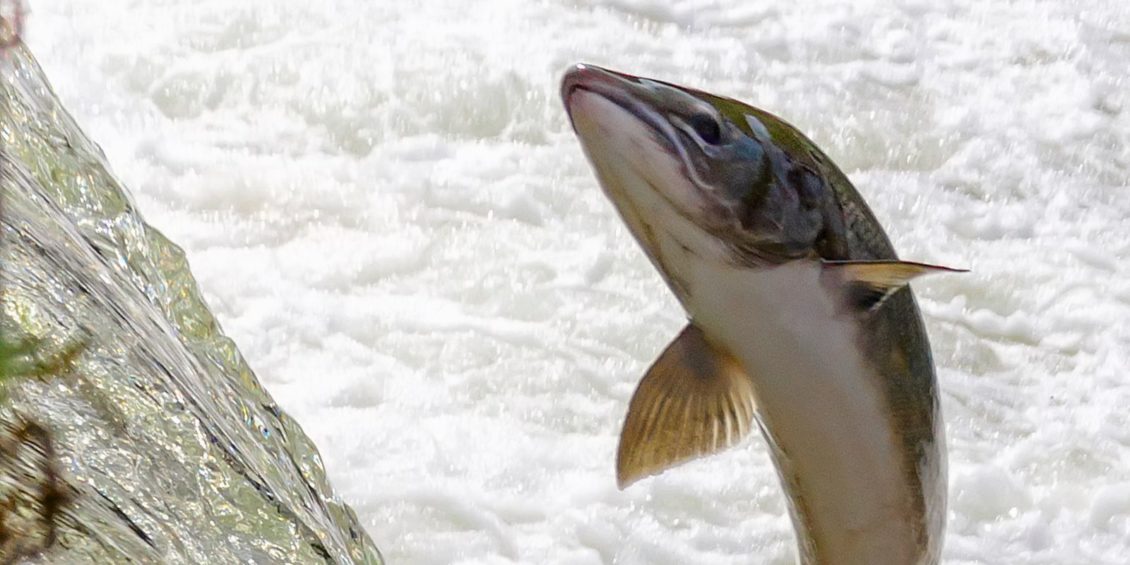Minister for Climate Change Julie James has announced a pot of nearly £11m to help curb the decline of Wales’ wildlife today, as she met with scientists working to save the Atlantic wild salmon. Experts say the ancient fish could disappear from Welsh rivers by the next two decades.
The Minister named nine new large and 17 medium projects who will benefit from the latest round of Nature Networks funding, to strengthen the resilience of Wales’ seas, forests and disappearing grasslands.
These are home to some of Wales’ most iconic species, including the curlew, otter and bottlenose dolphin.
Over centuries, physical barriers such as roads, development and farmland have left animals and plants stranded on unconnected ‘islands’, blocking migration routes and thus decreasing the gene pool and health of animal and plant populations.
These broken up habitats have left salmon and other species fighting for survival.
In response, Welsh Government set up the Nature Networks Programme to build ‘wildlife corridors’ throughout Wales, whilst enlisting local people in its efforts, as it calls for Team Wales action to tackle the global nature emergency.
Led by Swansea University, ‘Reconnecting the Salmon rivers of Wales’ has benefitted from more than £600k from the first round of the Nature Network Fund, which awarded £7m to 29 projects.
Its aim is to remove physical barriers that have blocked migration routes for wild Atlantic salmon and other species in the West Cleddau, EastCleddau, Usk, Tywi, and Teifi rivers.
Wild Atlantic salmon return to the river they were born just once in a lifetime to spawn.
To do so, they make an epic journey from the high seas to swim against currents as they mission upstream.
But now, this ancient fish featured so much in Welsh folklore, is met with culverts, dams and weirs that trap them in lower areas of the river.
Visiting the River Usk- which has seen the steepest decline of Atlantic salmon and where the project is working with stakeholders to redesign barriers that help fish move freely up and down stream, Minister for Climate Change, Julie James said:
“We all want a Wales that we are proud to pass onto our future generations. Currently they are facing quite a different world if we don’t stand up and act quickly in a Team Wales effort to tackle the climate and nature emergencies.
“Whilst we must do all we can to protect our precious Atlantic wild salmon- healthy, free-flowing rivers will benefit all of our physical and mental wellbeing.
“A thriving population of salmon indicates a clean and well oxygenated river where other species can flourish and tourism can boom. Whether you’re a bather, toe-dipper, twitcher, angler or kayaker – a healthy river means a more enjoyable countryside experience.”
Professor Carlos Garcia de Leaniz, coordinator of the Reconnecting the Salmon Rivers of Wales project said:
“People in Wales have been fortunate enough to enjoy the presence of iconic migratory fish like the Atlantic salmon, the sewin, the sea lamprey, the European eel or the shad for millennia.
“These form part of Welsh culture and are an integral part of Wales’ heritage and natural capital. But the UK has also some of the most fragmented, polluted, and dirtiest rivers in Europe, and the future of our native migratory fish is now under serious threat of extinction.
“A recent report indicates that if nothing is done Atlantic salmon may disappear from most Welsh rivers in as little as 20 or 30 years. We cannot let this happen.
“Our project [reconnecting the Salmon Rivers of Wales] will restore 141 km of fragmented river habitat. Healthy rivers are free-flowing rivers, and it is hoped that this and similar initiatives will make our rivers free-flowing again and help reverse the decline of Atlantic salmon.”
Andrew White, Director of The National Lottery Heritage Fund in Wales said:
“This impressive variety of projects demonstrates both the ambition of the Nature Networks Fund and the scale of the challenge facing us all.
“It’s a priority for The National Lottery Heritage Fund in Wales to protect the environment.
“This is why we support initiatives that help us meet our national nature recovery targets and mitigate the effects of climate change on heritage.
“Through partnerships such as this, we invest in work that helps halt and reverse the loss and decline of habitats and species and allow people to connect with our unique natural heritage.”
The Nature Network Programme is key in helping Welsh Government deliver the United Nations 30 by 30 goal, which aims to protect and effectively manage 30% of the planet’s marine and 30% of the planet’s terrestrial environment by 2030.
The Nature Networks Fund is a programme delivered in partnership by Welsh Government, National Lottery Heritage Fund and NRW to strengthen the resilience of Wales’ network of protected land and marine sites, supporting nature’s recovery while actively encouraging community engagement.









Leave a Reply
View Comments